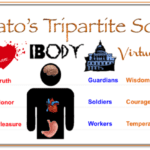Plato’s Republic (Books II-IV)

Genesis of the Polis (369a-434d)
(367b) They ask Socrates to defend justice for its own sake, not for its benefits to ones reputation. He admits this is no small task.
(368c-369a) He proposes to look for justice in the city first and then to proceed by analogy to find justice in the individual, just like the eye chart of letters to read helps us see bigger letters. In the end we will return to look at the effects and this approach will allow for a clearer judgment on the question of whether the just person is happier than the unjust person.
The city of pigs (369a-372d)
(369b-372c) Socrates starts by looking at the origin of political life and builds a just city in speech. We are not self sufficient for our own basic needs – need each other (e.g. the farmer needs a house and clothing and if he has extra food he can sell it etc), and that’s why we enter political life.
(370a) Each person has natural abilities. So each person shouldn’t make his own shoes, and therefore we need many more craftsmen. Then trade becomes important.
(370c) Doing a single job most suited to that ability is the most efficient way to satisfy the needs of all citizens. Need shopkeepers, merchants and wage earners to speak these goods. When they have what they need, these people just feast on breads and stuff.
(372d) Glaucon objects that Socrates’ city is too simple and calls it a “city of pigs.”
The luxurious city (372e-376c)
Socrates describes a city that allows for luxuries (“a feverish city,” 372e-373e).
(373e) Since excessive desires will cause people to want more than the basics, Socrates points out that the luxurious city will require an army to guard the city. Luxury is beyond the basics: embroidery, women’s articles, doctors, etc.
(375c) The army will be composed of professional soldiers (apply one man one job principle), the guardians, who, like dogs, must be gentle to fellow citizens and harsh to enemies – keen perception and brave (thumoide). This requires music and gymnastics.
Order in the Polis
Elementary education of guardians (376d-434d)
In arts and gymnastic (376d-408e) Book III
(376d) The guardians need to be educated very carefully to be able to distinguish what is to be feared (protect citizens, laws, and customs well.)
(377b) Poetry and stories need to be censored to guarantee such an education. The Illiad has two probs: 1) inappropriate depictions of the gods and 2) immoral conduct is not punished always.
Poetry should:
- (i) present the gods as good and only as causes of good (379a). Can’t allow just any old story to be read by chance by teachers because not everyone gets the notion of the good correct. Must censor certain stories.
- (ii) as unchanging in form (380d) The best things by nature are the least altered by change, and since the most simple things are the least changed also, then gods are changeless and simple.
- (iii) as beings who refrain from lies and deception (381e). Since god is not deficient in any way and since to change himself would then worsen an already perfect thing, then God abides simply in his own form. Therefore a perfect god would not want to deceive.
Book III
Since the guardians should not imitate anything but the superior, Socrates continues the political measures of the censorship of poetry:
- (iv) The guardians must not be too afraid of death so the underworld should not be portrayed as a bad place (386b);
- (v) The guardians must develop courage so the heroes and gods should not be presented lamenting (387e);
- (vi) The soul should fear its captain, and individuals should fear their captain/leader, so poetry should prevent people from laughing violently, a possible cause of not control. (388e);
- (vii) poetry should promote the guardian’s sense of truth-telling but with the willingness to lie when this is conducive to the good of the city (389b);
- (viii) “heart endures” talk is good to promote self-discipline and obedience (389c-d);
- (ix) it should not include stories that contribute to avarice (390d), like Zeus’ raping;
- (x) it should not include stories that contribute to hubris or impiety (391a).
(392d) Socrates moves on to discuss the manner in which stories should be told: simple narration (in third person) and imitative narration (in first person, 392d).
(394e-395d) To keep the guardians doing only their job, Socrates argues that the guardians may imitate only what is appropriate for this, because dabbling in many personalities means a failure in theirs, since these things become second nature.
(398b-399c) The just city should allow only fitting modes and rhythms for the content of poetry allowed in the just city. Avoid dirge modes like Lydian (crying) and the Ionian (softness). The
(400e-402c) Socrates explains how good art/crafts can lead to the formation of good character and make people more likely to follow their reason. So the craftsmen must be censored to not corrupt them with their inferior/ugly stuff, beauty must be promoted.
(403c-405b) Regarding the physical education of the guardians, he says that it should prepare them for war, a careful diet, and habits that contribute to the avoidance of doctors. There should be shame for spending one’s life in court or for doctoring oneself all the time, because its overly concerned with lower things. Its the mark of an uneducated man, but still wealthy man, and the court appearing type need other people to rule them.
Judges should be of old age, have good knowledge/experience of evil, but not experience doing evil. Those that have done evil have affection for it, dissimulate and distrust everyone.
Into their way of life (409a-427c)
(410b-c) Physical education should be geared to benefit the soul rather than the body, since the body necessarily benefits when the soul is in a good condition, whereas the soul does not necessarily benefit when the body is in a good condition. Too much music makes them too gentle, and too much gym makes them too aggressive.
(412b-414b) Socrates begins to describe how the rulers of the just city are to be selected from the class of the guardians: they need to be older, strong, wise, and wholly unwilling to do anything other than what of interest to the state. Men are unwillingly deprived of truth but willingly deprived of evil. They are deprived by
- (i) theft – reason is convinced easily over time or have short memory
- (ii) force – reason based on pain or suffering of concupiscible appetite
- (iii) sorcery – reason based on being terrified by some fear of irascible appetite
We should filter out acceptable candidates by subjecting them to pains, pleasures and witchcraft to guard the self and culture they have received and give them rewards in life and death.
(414b-415d) Socrates suggests that they need to tell the citizens a myth that should be believed by subsequent generations in order for everyone to accept his position in the city. The myth of metals portrays each human as having a precious metal in them: those naturally suited to be rulers have gold, those suited to be guardians have silver, and those suited for farming and the other crafts have bronze.
(415e-416e) Socrates proceeds to discuss the living and housing conditions of the guardians: they will not have private property, they will have little privacy, they will receive what they need from the city via taxation of the other classes, and they will live communally and have common messes. Its important that metals stay in their class because when the guardians laxen their obedience to rulers or become attached to private property they become brass and disobedient, and can’t defend the city from a rebellion from within because they are fearing each other instead of trusting their masters.
Book IV
(419a) Adeimantus complains that the guardians in the just city are not going to be happy.
(420b) Socrates points out that the aim is to make the whole city, and not any particular class, as happy as possible. He also thinks they will likely be the most happy in the city. Socrates discusses several other measures for the city as a whole in order to accomplish this:
- There should be neither too much wealth (makes craftsmen illiberal) nor too much poverty (makes craftsmen distracted) in the city since these cause social strife (421d-422a). Both are bad because they lead to the wrong kind of innovation. Better to be small and united than big size.
- The just city should be only as large in size as would permit it to be unified and stable (423b).
(423e) Socrates reemphasizes the importance of the guardian’s education and suggests that the guardians will possess wives and children in common,
(424b-425e) He suggests that guardians should protect their houses and areas from innovations in musical style and education, because they tend toward change in the laws.
- Civilizations always rise or fall from changes in the type of music, not the lyrics as much.
- If overthrown, it canbe restored by educating children in the “trifling conventions which ancestors altogether abolished” – making these laws would be silly however.
- Don’t allow invalids or utopianists to amend the laws of your state because they perpetually will be expecting to end all evil with the latest ideas.
- (427b) The just city will follow traditional Greek religious customs and protect its constitution. Protect the constitution at all costs and the interpretation of your theology you should only entrust to the “God of your forefathers”
In the 4 political virtues (427d-434d)
(427d) With the founding of the just city completed, Socrates proceeds to discuss justice. He claims that the city they have founded is completely good and virtuous and thus it is wise, courageous, moderate, and just (427e). Justice will be what remains once they find the other three virtues in it, namely wisdom, courage, and moderation (428a).
- Sophia. The wisdom of the just city is found in its rulers and it is the type of knowledge that allows them to rule the city well, not in a particular trade (428b-d). The guardians are the ruling but smallest class.
- Andrea. The courage of the just city is found in its military and it is correct and lawful belief about what to fear and what not to fear (429a-430b). Courage is the quality that under all conditions (under influence of any pain and pleasure and fear) one will preserve the conviction that things to be feared are precisely those which and such as the lawgiver inculcated in their education. Like a piece of wool that has been died but also sealed in by treatment. Right and lawful belief about things to be feared and not to be feared.
- philosophic bravery
- epikouroi (defined above)
- casual civic bravery in ordinary states
- animal instinct bravery
- Sophrosune. A concord or harmony in the city resulting from each pereson being “mater of himself”. That is control of the animal or worse side of man by the better side – reason. By this soberness and self-discipline the rulers and the ruled are in unanimity in following the just city’s structure: who should rule and who should be ruled (430d-432a), and simple chant… The weaker should refrain from rule.
- Dikaia. The city’s justice consists in each class performing its proper function (433a-b). It is undone by the imperfect entering the more perfect classes, or by someone trying to do the job of all the other classes. Injustice does the greatest harm to a state.
Ethical Justice and Order in the Individual
3 parts of the soul (434d-441c)
(434d) Since it would be absurd to suppose that the virtues of the state are not found in its individuals, Socrates then proceeds to find the corresponding four virtues in the individual.
(435a-b) Socrates defends the analogy of the city and the individual and proceeds to distinguish three analogous parts in the soul with their natural functions (436b). Noncontradiction established:
- Since no thing can at the same time and same respect do opposite things (a top moves in a circle in one respect, and doesn’t move in another),
- and since someone either thirsts or wills or does not third or does not will (that someone desires good drink is implied
- then there can be an architectonic science but also a science of desire, and wisdom and courage. Distinguishes functions in soul:
By using instances of psychological conflict, he distinguishes the function of the rational part from that of the appetitive part of the soul (439a). We specify sciences but we cannot say that the same part of the same thing acts in opposite ways.
- Reason: When perfected is wisdom. because some men are very thirsty but can still decide not to drink.
- Thumos (439e-440e): anger. When perfected, is courage. Helps reason “feel”. Since men are able to suffer desire without anger, and since a man gets angry when wronged, then thumos is different than epithomos as helper of the reason (just like guardians in just city).
- Epithumos: just desire. When perfected, is temperance.
Cardinal virtues in the soul (441c-445e)
Socrates explains the virtues of the individual’s soul and how they correspond to the virtues of the city (441c-442d). One is just when each of the three parts of the soul performs its function (442d) in a united way: self unity. Virtue is a kind of health of soul.
(444e) Justice is a natural balance of the soul’s parts and injustice is an imbalance of the parts of the soul .
(444e-445a) Socrates is now ready to answer the question of whether justice is more profitable than injustice that goes unpunished.
(445c-e) To do so he will need to examine the various unjust political regimes and the corresponding unjust individuals in each .




